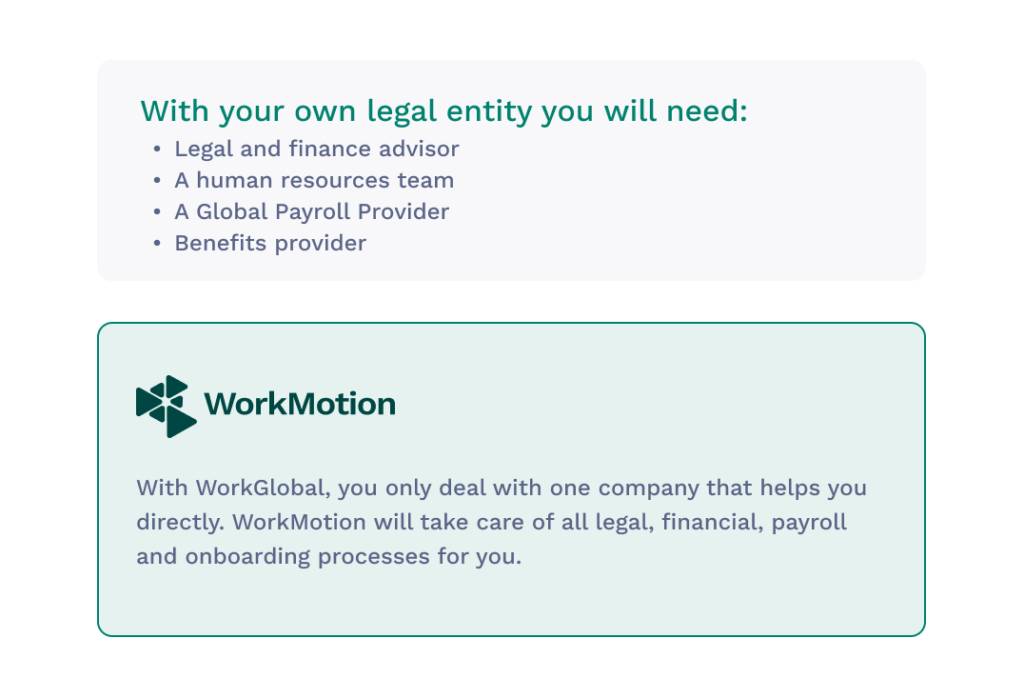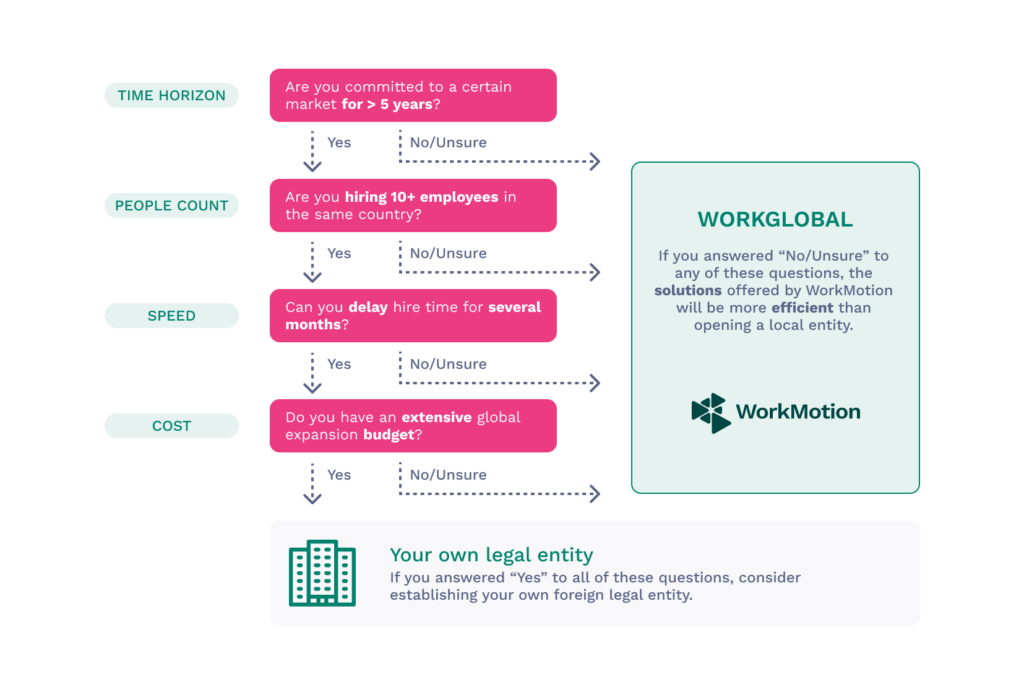So you’re thinking about how to set up an entity or even how to set up a business entity in another country?
Setting up an entity involves several steps and considerations. The specific process can vary depending on the jurisdiction and the type of legal entity you want to establish. However, here’s a general overview of the steps involved in setting up a legal entity for a company.
So the big question is: should you set up your own legal entity or work with a company that takes care of onboarding? If you are exploring how to set up a foreign entity or planning a global entity setup, this guide will help you understand the process. Let’s first see what goes into setting up your own legal entity.
Here’s a step-by-step guide for the entire process:
Choose a jurisdiction: Determine where you want to establish your legal entity. This could be in the country or state where your business operates or another jurisdiction with favourable business laws. This decision is crucial for setting up an international company or any entity abroad.
Choose the type of entity: Decide on the type of legal entity that best suits your company’s needs. Types of entities also differ based on the country you decide to go to, but the following are the most common types:
- Sole proprietorship: Simplest form, but offers no separation between personal and business liabilities.
- Partnership: Similar to a sole proprietorship but involves multiple owners.
- Limited Liability Company (LLC): Provides personal liability protection for owners while maintaining flexible management.
- List Corporation: Offers strong liability protection, a formal structure, and the ability to issue stock to raise capital.
Select a business name: Choose a unique and available business name that complies with the regulations of your jurisdiction. Also, do a thorough check to see if this name is available or already taken.
Register the entity:
– Select a law firm to work with
– Prepare documents for incorporation
– File the necessary paperwork with the appropriate government agency. This often involves submitting articles of incorporation/organisation or partnership agreements, depending on the type of entity
– depending on the type of entity, you might need to draft bylaws (for corporations) or an operating agreement (for LLCs)
– Pay any required fees
Obtain an Employer Identification Number (EIN): A unique, government-issued number for tax purposes. It’s necessary for hiring employees, opening a business bank account, and filing taxes. This is applicable in most countries, but may not be called an EIN in every country.
Fulfill regulatory requirements: Depending on your industry and location, you might need to obtain specific licences or permits to operate legally. This could include health permits, environmental permits, and more. Another potential required step is contacting Health & Safety vendors for mandatory health checks for employees as part of regulatory compliance.
Open a bank account: Set up a business bank account to keep your personal and business finances separate. This can be a long and complex process. Usually, you have to go through extensive KYC and a tedious onboarding process.
Set up financial and legal infrastructure: Establish accounting and bookkeeping systems (such as sourcing a local provider to handle accounting) to keep track of your company’s finances. Also, consider consulting with legal and financial professionals to ensure compliance with all regulations. This step is essential for any legal entity setup or entity setup project.
Comply with tax requirements: Register for local, state, and federal taxes as required. It might include income tax, Value Added Tax (VAT), sales tax, and employment taxes.
Understand local regulations and business culture: Before setting up a legal entity or entity abroad, it is critical to research local regulations and business practices. Each country has unique labour laws, tax policies, corporate governance rules, and cultural nuances that affect how your global entity operates. For example, employment contracts, payroll structures, and mandatory benefits differ widely across regions. Failing to account for these can create compliance risks and operational inefficiencies when setting up international company operations.
Plan for ongoing compliance: Once you have completed your legal entity setup, it is crucial to maintain a healthy global entity setup. This includes regular filings, statutory reporting, audits, and tax submissions. Automating these processes or partnering with local experts can streamline compliance and ensure that you set up global operations in alignment with local law.
Consider corporate structure flexibility: Choosing the right entity type at the outset is essential, but your business may evolve. Setting up a legal entity with flexible corporate structures enables scalability, fundraising, and cross-border expansion. For instance, some jurisdictions make it easier to convert an LLC into a corporation or merge with another entity abroad. Planning for future growth ensures your set-up entity abroad strategy does not create bottlenecks later.
Leverage technology for remote management: Digital tools and HR platforms can simplify entity setup and management across borders. Setting up international company structures often uses software to manage payroll, compliance, employee onboarding, and reporting from a single interface, reducing the time and cost involved in traditional legal entity setup.
Evaluate cost implications: Before setting up a legal entity in a new country, understand local operational costs, taxes, and fees. A well-planned global entity setup strategy can help optimize expenses while ensuring full compliance. Factoring in these costs early can prevent surprises and help your entity abroad function efficiently.
Ultimate Beneficial Owners (UBO) registration: The UBO register is a register in which all “Ultimate Beneficial Owners” or “beneficial owners” of a company or another legal entity are registered.
Hiring employees: If you plan to hire employees, you’ll need to comply with employment laws, obtain workers’ compensation insurance, and set up payroll systems.
Protect intellectual property: If your company has intellectual property (patents, trademarks, copyrights), consider registering them to protect your rights.
Stay updated: Maintain compliance with ongoing legal and regulatory requirements, including filing annual reports, renewing licences, and paying taxes.
It’s important to note that setting up a legal entity can be complex and requires careful consideration of legal, financial, and operational factors. Consulting with legal and financial professionals familiar with the regulations in your jurisdiction is highly recommended to ensure you navigate the process correctly. Businesses trying to set up global operations or set-up an entity abroad often underestimate time, cost, and compliance challenges.
What if we told you there’s an easier way?
With our solution, we can help you easily hire employees through an Employer of Record (EOR).
How does an EOR benefit you?

How can WorkMotion help you hire abroad without your own legal entity?
With Employer of Record, you can hire skilled talent in 160+ countries without setting up a local entity with our Employer of Record (EOR) services. While a global entity setup can help, you can expand faster with an EOR. An EOR is a service provider that manages the legal, HR, tax, and local compliance responsibilities of your talent in any country where you don’t have your own legal entity. An EOR hires, onboards, and pays your talent on your behalf. The EOR is the legal employer, while you retain the role of managing the employer and overseeing the day-to-day management of the talent.
In other words, you decide who to hire, how to compensate, what work to perform, and when to terminate. The EOR is your HR service that helps keep your business compliant with local laws in the country where your talent lives and works.
Let’s assume you want to expand into France, hire developers in Ukraine and Poland, and have a sourcing manager in China. That’s four different countries with entirely different labour laws, employment contract regulations, HR processes, payroll challenges, and compliance risks.
In that case, you simply provide the EOR with information about the person you want to hire, along with other key details (start date, compensation, etc.). The EOR then navigates the local laws and handles all the paperwork for onboarding the talent. This frees you of the cost, time, and distraction of bureaucracy and, more importantly, allows you to focus on growing your business.
An EOR hires employees in the new country through a local business entity and assumes all risk. As the legal employer, the Employer of Record is responsible for:
- Employment contract and compliance
- Adhering to local labour laws
- Advice on required notice periods and termination rules
- Check visa, immigration, and work permit status
- Country-compliant payroll and taxes
- Payments of salaries, taxes, and social security
- Benefits e.g., statutory ones such as holidays, maternity leave, etc.
Your Own Legal Entity vs. WorkGlobal
Should you open your legal entity or work with an Employer of Record providers?

Why use Employer of Record? Final Thoughts
As an EOR provider, we are experts in local labour laws compliance, tax regulations, and employment practices. If you are still researching how to set up an entity or comparing options for a global entity, an EOR may save you time, reduce costs, and mitigate risk. We can help you set up a truly international, silent workforce without the paperwork or legal hassles. If you’re still wondering if this is the right choice for you, speak to our specialists today.
FAQs:
The first step is to research local regulations, choose the appropriate jurisdiction, and determine the legal entity setup that best suits your business needs.
You can hire through an Employer of Record (EOR) to manage compliance, payroll, and HR, without setting up a complete entity abroad.
Setting up your own entity involves a full legal entity setup, while an EOR lets you hire internationally without one.
Countries with business-friendly laws, transparent tax systems, and simplified registration processes are ideal for setting up a legal entity or entity abroad.
Skipping proper entity setup can lead to non-compliance with local laws, tax issues, fines, and challenges in enforcing contracts when operating a global entity.
Yes, but local laws may require adjustments. A flexible global entity setup strategy helps standardize processes while complying with regional regulations.
It depends on the country and type of entity. Typical timelines for setting up a legal entity range from a few weeks to several months, including regulatory approvals and registration steps.









